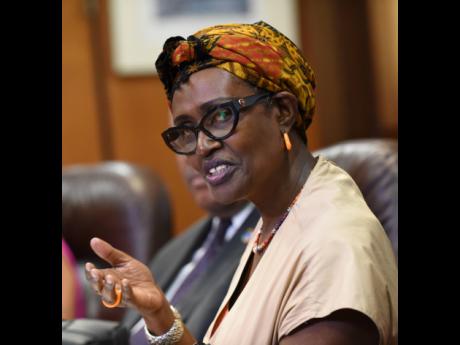‘Jamaica can do better’
Global AIDS chief says island lagging Caribbean on disease response targets
With the global AIDS response under threat, executive director of the Joint United Nations Programme on HIV/AIDS (UNAIDS), Winnie Byanyima, has called for improvement as Jamaica lags average Caribbean performance on two targets. The UNAIDS 90-90-90...
With the global AIDS response under threat, executive director of the Joint United Nations Programme on HIV/AIDS (UNAIDS), Winnie Byanyima, has called for improvement as Jamaica lags average Caribbean performance on two targets.
The UNAIDS 90-90-90 target called for 90 per cent of all people living with HIV to know their HIV status, 90 per cent with diagnosed HIV infection to receive sustained antiretroviral therapy, and 90 per cent of antiretroviral therapy recipients to have viral suppression by 2020.
Byanyima said Jamaica achieved the first target but fell short in the other two areas, as only 45 per cent were on antiretrovirals and 37 per cent were virally suppressed.
“The average of the Caribbean is better than this,” the executive director said, reflecting on Jamaica’s scorecard.
Byanyima said that Jamaica has been able to reduce new infections by 14 per cent and deaths by 16 per cent in the last 10 years.
Though significant, she said it could be greater, as countries like Uganda, where the burden of HIV is higher, have registered dramatic declines in infections and deaths by more than 30 per cent and just under 40 per cent, respectively, over the same 10-year period.
Byanyima proposed four critical actions that Jamaica needs to take in an effort to achieve the 2025 target of 95-95-95, given the loss in progress owing to the COVID-19 pandemic and other factors.
She said Jamaica must maintain its investments in health, education, and social protection and increase the spend if possible.
“These are very important for fighting any pandemic, including HIV. Maintaining these investments, even in these real, challenging times where governments are running a very tight fiscal policy, is very important,” she said in a Gleaner interview at the newspaper’s central Kingston offices.
Byanyima said effective coordination is also important to allow for resources to be allocated according to needs.
She told The Gleaner that under-reporting is a concern, which is likely linked to stigma and a lack of institutional arrangements.
“What I found, that’s not here, but that I find in many other countries and it works, is an institution that brings together and coordinates across different parts of government. This makes a difference.
“When you have a national AIDS council that brings together different departments from finance, health, education, social affairs, and human rights, pulling them together to each deliver their bit, then you get a strong response. A national coordinating body is missing, and that might be the reason certain parts of the response are not strong enough,” she said.
The executive director expressed concern about the accuracy of the data available on newly infected people, HIV deaths, disaggregation among the newly infected – gay, bisexual, sex worker, migrant, or prisoner.
“This data needs improvement, and I believe Jamaica has capacity, as a middle-income country, to organise and strengthen that, and there are partners willing to help, like PEPFAR global funds and ourselves, UNAIDS,” she said, adding that it will help the country to plan an effective response.
Further, Byanyima said work is needed on the policy front to challenge stigma and discrimination, as approximately 81 per cent of people living with HIV/AIDS in Jamaica tend to hide their status.
“These are the things that will help Jamaica to get back on track, and it is not hard for Jamaica to get back on track,” she said.

